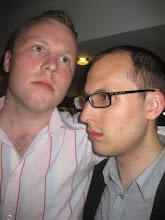Hola frijoles! (yes, I just said ‘hello beans!’). This being my first post on here, I hope it’s not too terrible a read. I suppose I should start with why I wanted to participate in the postmedieval reading group, which is largely due to my current attempts to get “in touch” with the Middle Ages. I’ve always been fascinated by medieval literature, but lately have been wondering what exactly is my place in it all. My family comes from Puerto Rico and the Philippines, two places that have never (as far as I know) been discussed as even having a medieval history. Of course, one can love and study topics outside of one’s culture(s) (and really, whatever my ‘culture’ happens to be is one convoluted mess anyway), but still I have those ‘but Sam, really, why are you so invested in this?’ moments.
As a slight digression, I was recently half-watching a horror film called Borderland, which had a cliché plot involving some college peeps getting killed by a cult in some Mexican border town. The movie sucked, but the title got me thinking about borders, which got me thinking about Gloria Anzaldua’s Borderlands/La Frontera: The New Mestiza. In it, she discusses how borders are unnatural and (no surprise here) confining, and how they affect people politically, socially, and psychologically. If borders affect individuals in such potentially traumatic ways, how detrimental are they, then, to scholarship? I typically find that it is in the borderlands—these geographical, theoretical, what have you middle, outer, third, in-between, around spaces—that truly remarkable and interesting intersections of ideas take place.
One could say that there are indeed studies being done in, for example, medieval Chinese, Indian, Japanese, etc histories and literature. However, these are often being done in departments separate from traditional ‘medieval studies’ departments. Why? Why not open up (capital O open?) the borders of the Middle Ages, bust it out of Western Christian Europe, utilize, say, the vast amount of theory lumped under the terms ‘postcolonial’ or ‘postmodern’ in the analysis of it? Should we? While my response to the latter question is a resounding ‘well, hells yeah we should,’ I do understand that not everyone would agree with this.
Perhaps then my niche could be in this growing movement to globalize the Middle Ages. I’m hoping to start with my MA thesis, which will be on an Arthurian romance that was translated into Tagalog in 1889, from a c.1513 Spanish text. There was an interesting situation in the Philippines where, up until American occupation in 1902, the reading matter of the natives was largely medieval Spanish literature. How literate were the natives, how much of this literature was read, published, etc, I’m still working out. I’m hoping to look at what the Tagalog version has made of the stuff from Europe, what it’s doing/keeping/excluding, and what the post-colonial reception of a medieval text was/is, among other things. So far I just have some of the text translated and the title:
Dinaanang Buhay ni Tablante de Ricamonte sampo ng Mag-asauang si Jofre at ni Bruniesen sa Caharian nang Camalor na Nasasacupan nang Haring si Artos at Reina Ginebra
which means:
The past life (or story) of Tablante de Ricamonte including the married couple Jofre and Bruniesen, who were living in the kingdom of Camelot under the rule of King Arthur and Queen Guinevere.
There are also some connections I’m finding to Cervantes and some other interesting tidbits that I’ll perhaps update everyone on in another blog entry once I get further into my research.
Anyway, despite the progressively dire news about the state of the humanities floating about, I’m finding it fairly exciting to be in the field right now. I’ve recently found some of the scholarship that Geraldine Heng has done, as well as the Global Middle Ages Project or G-MAP(http://www.laits.utexas.edu/gma/portal/) which includes G-MAP, Mappamundi, and the Scholarly Community for the Globalization of the Middle Ages (SCGMA), all aiming to coordinate scholarly efforts to expand on the borders of the Middle Ages. There is also apparently a book titled Medieval Culture and the Mexican American Borderlands, which has unfortunately received 2 stars on amazon.com, but if anyone has read this, let me know if it’s any good. And of course, if anyone has anything else that could possibly help in my research, I’d definitely appreciate it.
Hmm, I never know how to end these things, so…er…until next time?
~Sam

